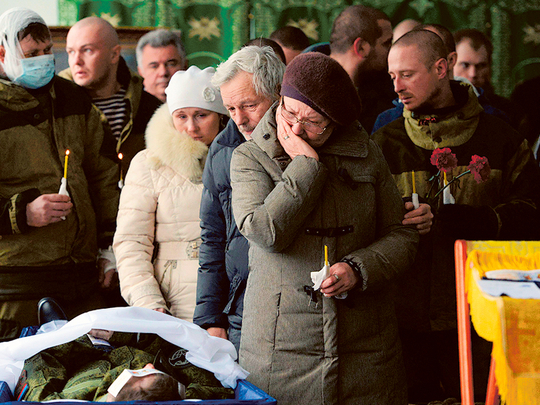
Kiev: A shaky truce in Ukraine was already at risk on its second day on Monday with both the Kiev government and pro-Russian separatists accusing each other of attacks holding up an agreed pullback of heavy weapons from the front line.
“There is no question at the moment of us withdrawing heavy weapons” because of persistent rebel attacks, a Ukrainian military spokesman, Vladyslav Seleznyov, said.
“The withdrawal of military hardware can only happen under certain conditions and one of them is a full ceasefire,” Eduard Basurin, a spokesman for the defence ministry of the self-proclaimed Donetsk People’s Republic was quoted as saying by the rebels’ official news agency.
The main hot spot was Debaltseve, a key transport hub located between Donetsk and Lugansk, where fighting is unabated.
Pro-Russian rebels pounded encircled Ukrainian government forces on Monday and Kiev said it would not pull back heavy guns while a truce was being violated, leaving a European-brokered peace deal on the verge of collapse a day after it took effect.
The European Union announced a new list of Ukrainian separatists and Russians targeted with sanctions, to which Moscow promised an “adequate” response.
Fighting had subsided in many parts of eastern Ukraine after a ceasefire came into force from Sunday, under a deal reached last week in marathon talks involving the leaders of France, Germany, Russia and Ukraine.
But the truce appears to have been stillborn in the part of the front where the most intensive fighting has taken place in recent weeks.
Rebels announced hours after it came into effect that they had no intention of observing the ceasefire at the town of Debaltseve, where they have been advancing since January and now have a Ukrainian unit all-out encircled.
Washington says the rebel operation around the town, which sits on a strategic railway hub, is being assisted by the Russian armed forces, which Moscow denies.
Reuters reporters near the front said Debaltseve was being relentlessly bombarded with artillery. At least six tanks as well as armoured personnel carriers and artillery could be seen in woods near Vuhlehirsk, 10km (six miles) west of Debaltseve, which the rebels captured a week ago.
Firing of rockets
Military trucks headed along the main road in the direction of the town to regular bursts of shelling and the firing of Grad rockets and machine guns.
“You can hear there is no ceasefire,” said a rebel fighter with a black ski mask who gave his name as Scorpion, his nom de guerre, and blamed the fighting on Kiev’s forces. “Debaltseve is our land. And we will take Debaltseve.” Kiev said its forces were shelled more than 100 times after the truce took effect. Military spokesman Andriy Lysenko said government troops could not pull back their own heavy weapons, as set out in the agreement reached in the Belarussian capital Minsk, without a ceasefire that held.
“The precondition for withdrawal of heavy weapons is fulfilling Point One of the Minsk agreements — the ceasefire. One hundred and twelve attacks are not an indicator of a ceasefire. At the moment we are not ready to withdraw heavy weapons,” Lysenko told a news briefing in Kiev.
The military in Kiev said five of its soldiers had been killed and 25 wounded since the ceasefire took effect the previous day.
In Berlin, German Chancellor Angela Merkel’s spokesman Steffen Seibert, said it was important that the withdrawal of heavy weapons begins as scheduled on Tuesday. Merkel was the driving force behind intensive diplomacy to end the war last week, flying to Kiev, Moscow and Washington before staying up all night for the talks in Minsk that produced Thursday’s deal.
The West says Putin, who has called eastern Ukraine “New Russia”, has sent troops and weapons to back the rebels. Moscow denies this and accuses the West of waging a proxy war in Ukraine to seek “regime change” in Russia.











